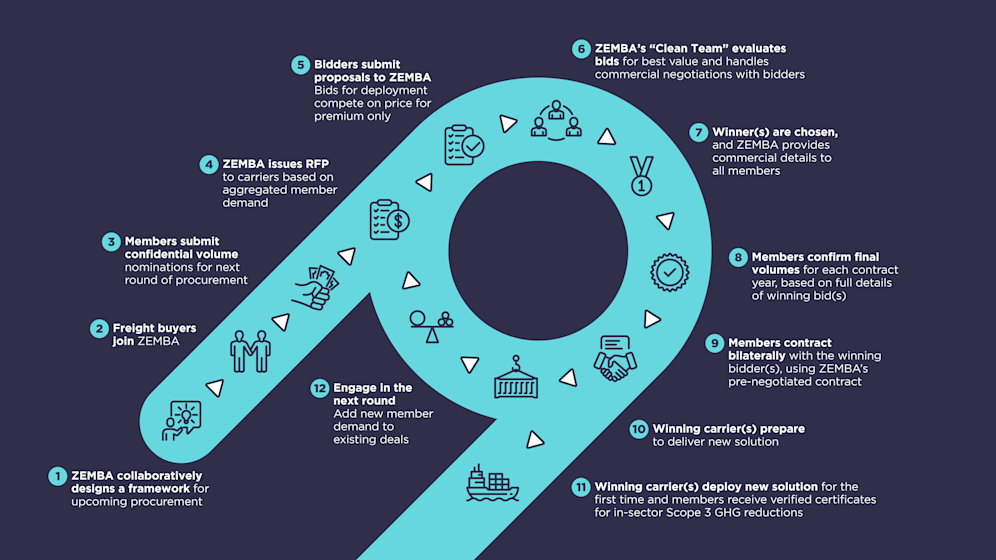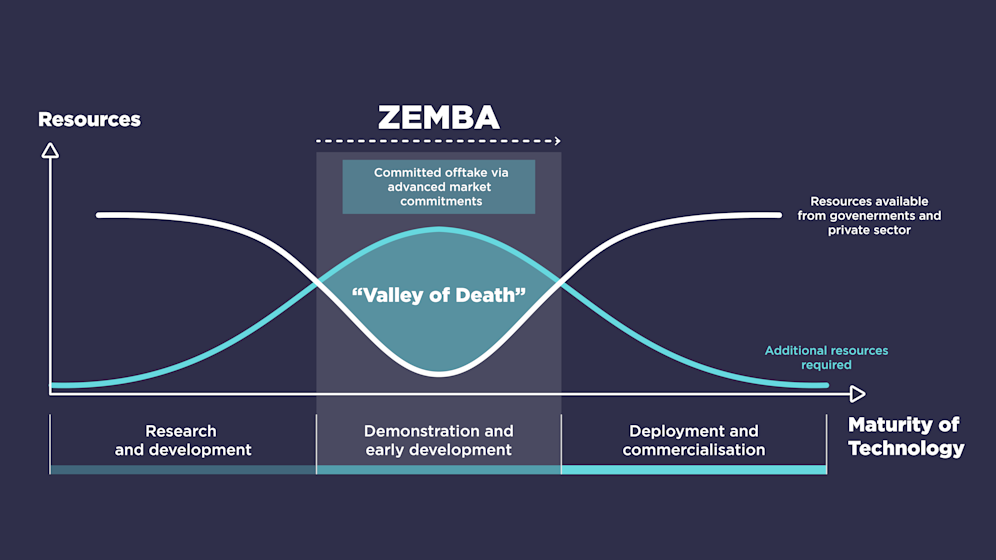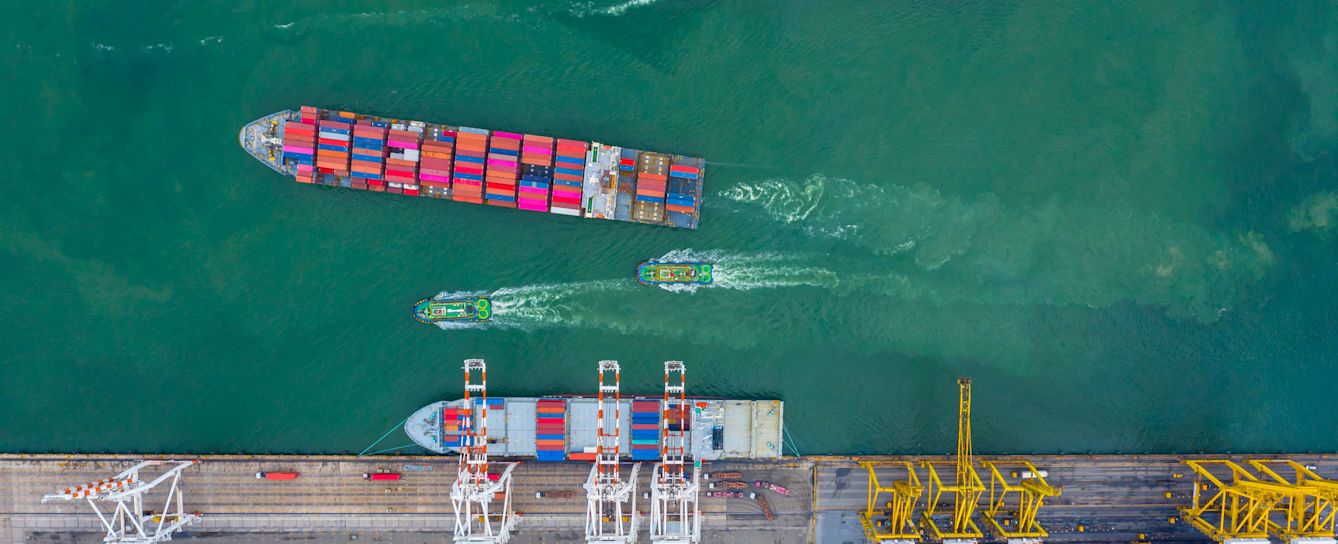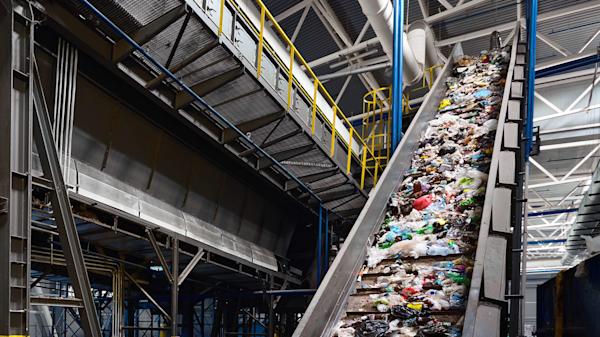In brief
Before 2023, companies looking to decarbonise their supply chains had no viable access to zero-emission shipping solutions. High costs and uncertain demand gave carriers little incentive to invest in zero-emission fuels, barring individual businesses from shifting the market. The Zero Emission Maritime Buyers Alliance (ZEMBA) emerged as a collective procurement initiative to aggregate demand and send a clear signal to shipping providers and policymakers for new shipping solutions.
A challenge of scale
Each day, millions of raw materials and products are moved across the ocean. Global seaborne trade, reliant on fleets that run on cheap, carbon-intensive fuels, accounts for nearly 3% of the world’s greenhouse gas emissions. Despite this, zero-emission alternatives remain commercially out of reach.
Zero-emission fuels (1) are predicted to cost up to five times more than traditional high-emission fuels. Even if freight buyers are willing to pay this premium, an additional hurdle remains – a single freight buyer only controls a fraction of a ship’s containers, which number anywhere between 200 and 25,000, and must spread their total freight across multiple ships, shipping lines, and routes. This fragmentation makes it nearly impossible for suppliers to build a compelling business case for transitioning to the cleanest fuels and technologies.
ZEMBA – collaboration as an unlock
In 2021, the Aspen Institute’s Energy & Environment Program launched the Cargo Owners for Zero-Emission Vessels (coZEV) initiative. In its inaugural ambition statement, coZEV called for the industry to fully decarbonise by 2040, with a dual focus on driving policy change and helping companies build an investment case for reducing emissions.
We always wanted to aggregate demand and get money channelled into commercial contracts for longer-term offtake, but companies told us they needed a publicly declared ambition to justify the investment, so that’s where we started.
– Ingrid Irigoyen, CEO of ZEMBA
Carrying the momentum from coZEV, industry leaders including Amazon, Patagonia, and Tchibo joined forces with the Aspen Institute to establish ZEMBA as a nonprofit in 2023. With the Aspen Institute acting as its secretariat, ZEMBA set out to build a buyers alliance that could leverage its members’ purchasing power and commit to accelerating a new market for zero-emission shipping.
Economies of scale right out of the gate
Procurement collaborations between competitors carry legal and reputational risks, such as antitrust violations, contractual inflexibility, and the handling of sensitive commercial data. To navigate this, ZEMBA was set up as a neutral third party, with clear rules, oversight from a legal team, and technical support from the Center for Green Market Activation (GMA) and Lloyd’s Register Maritime Decarbonisation Hub.
Each meeting involved professionals from a wide range of disciplines: economists, marine fuel and technology experts, carbon accounting advisors, procurement professionals. At least one lawyer was also present, to balance speed with the reassurance from all the participating companies that they would adhere to technical guardrails.
It was a very collaborative and interdisciplinary co-creation process, but it was also fast! Just one year after establishing ZEMBA, we announced the results of our first collective request for proposal.
– Ingrid Irigoyen, CEO of ZEMBA

This robust legal and technical foundation enables ZEMBA’s tender process. Members, often from sustainability or procurement teams, first nominate the volume of freight they intend to decarbonise. These volumes are then combined to form a collective demand for zero-emission shipping. With input from industry experts – who assess the technical readiness and commercial viability of fuel options – ZEMBA issues competitive requests for proposals to shipping carriers, under clearly defined rules that ensure fair competition. After the neutral panel of experts selects a winning bid, ZEMBA members can choose to sign bilateral contracts and claim the associated emissions reductions once the zero-emission fuel or technology has been deployed and verified.
Because companies rarely control when or where zero-emission shipping is available, ZEMBA uses Katalist, the first nonprofit maritime book and claim system, which separates physical freight movement from emissions accounting. This means members can fund and claim the reductions even when their cargo isn’t on a zero-emission ship. Unlike traditional offsetting, this is an in-sector investment in clean shipping deployment.
In its first tender, ZEMBA secured 17 bilateral contracts and avoided 82,000 tonnes of CO₂e emissions. A second tender is underway to accelerate the availability of e-fuels and expand the number of vessels equipped to use them – a leap towards transforming the sector.
Financing: ZEMBA does not currently charge membership fees, which lowers the barrier to entry for many prospective companies. Its operations are philanthropically funded, while member companies finance zero-emission shipping directly by paying a premium through the bilateral contracts they sign with selected carriers. ZEMBA’s focus on scalable solutions ensures a return on investment through lower future costs while allowing members to benefit from economies of scale in these premiums.

A blueprint for creating new markets for the circular economy
ZEMBA’s success reflects a broader trend: sectors like trucking and aviation are adopting similar models to aggregate demand and accelerate decarbonisation, while major fashion brands are pooling demand to accelerate next-generation materials. Since 2021, the Sustainable Aviation Buyers Alliance, developed by GMA, the Environmental Defense Fund, and Rocky Mountain Institute, has developed a model to catalyse nearly USD 200 million in sustainable aviation fuel investment.
Innovations in technology, services, and materials are integral to achieving a circular economycircular economyA systems solution framework that tackles global challenges like climate change, biodiversity loss, waste, and pollution. It is based on three principles, driven by design: eliminate waste and pollution, circulate products and materials (at their highest value), and regenerate nature., but when many reach the “valley of death” between R&D and commercial deployment, they stall. ZEMBA’s model bridges this gap by helping companies aggregate future demand, build the business case for suppliers, and then reduce costs through coordinated procurement. It offers hard-to-decarbonise sectors a replicable pathway to commercial transformation.
Today, ZEMBA’s membership stands at over 40 multinational companies, including IKEA, Pernod Ricard, Phillips, and Reckitt. Through collective action, neutral governance, and a shared commitment, it is overcoming the barriers to market maturity to make zero-emission shipping the new default – and ultimately create a competitive market for zero-emission shipping in which ZEMBA is no longer needed.
Prompts for action
Where in your industry are technically viable solutions struggling to scale because of high costs and insufficient demand?
Who else in your industry, even among your competitors, is facing the same innovation challenge and might be ready to act with you?
How could you work with your competitors to send a collective market signal for next-generation solutions and give suppliers the confidence to invest?
Footnote:
1. Zero-emission fuels: Fuels produced with low-carbon sources of energy and sustainable waste sources of carbon that reduce shipping emissions by around 90% at least on a life cycle basis upon deployment.






